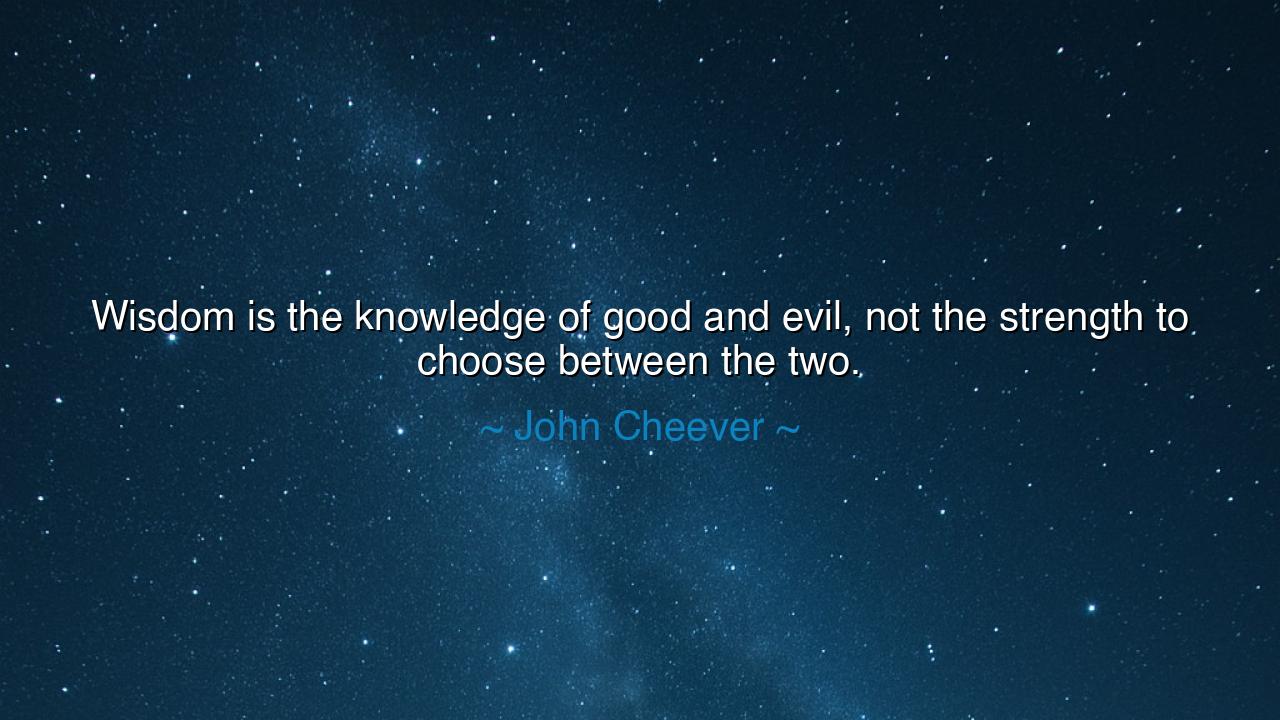
Wisdom is the knowledge of good and evil, not the strength to






“Wisdom is the knowledge of good and evil, not the strength to choose between the two.” — John Cheever
In this haunting and reflective saying, John Cheever, the great chronicler of the human soul, lays bare the tragic paradox of wisdom. He reminds us that to be wise is not necessarily to be virtuous, for wisdom grants understanding—but not always the will to act rightly. True wisdom, he says, is the knowledge of good and evil—the clear vision of life’s moral landscape, its shining peaks and its dark valleys. Yet such knowledge alone does not give a man the strength to climb the mountain of righteousness or resist the temptations of the abyss. It is the curse and the glory of human understanding: to see both paths, but still tremble before the power of choice.
Cheever’s words rise from the depths of his own life and art. A man who explored the hidden frailties of the modern heart, he lived among the polished houses and quiet sorrows of twentieth-century America, seeing how men and women often knew the right path but failed to follow it. He understood that knowing what is right does not ensure the courage to do it. The human heart is not ruled by reason alone; desire, fear, vanity, and weakness all conspire to steer it astray. Thus, Cheever speaks not with judgment, but with compassion—for in his wisdom he knew that even the enlightened stumble, that to understand good and evil is to stand forever at war within oneself.
This truth is ancient. It echoes from the first story of humanity itself—the tale of Adam and Eve. When they ate of the Tree of Knowledge of Good and Evil, their eyes were opened. They gained understanding, but with it came sorrow, shame, and the burden of conscience. They knew good and evil, yet they did not have the strength to choose the good. Their exile from Eden is not only a tale of punishment but of awakening: the dawning of moral consciousness without the power to perfect it. Cheever’s quote captures this same eternal dilemma—that knowledge illuminates, but does not sanctify; that to be wise is often to suffer, seeing what must be done and feeling the weakness that prevents its doing.
History, too, bears witness to this agony of wisdom without strength. Think of Oskar Schindler, the German industrialist who began as a profiteer in the Second World War. Surrounded by evil, he saw it clearly—he knew it, he understood it—and for a time, he was complicit in it. Yet gradually, that knowledge grew unbearable to his soul. In his torment, wisdom ripened into courage, and he used his wealth and influence to save over a thousand Jewish lives. His story shows that wisdom alone begins the journey—it opens the eyes—but only the strength of conscience completes it. Many, like Schindler in his early days, see good and evil, yet remain frozen by comfort, fear, or indifference. Few find the strength to act.
Cheever’s insight thus pierces to the core of what it means to be human. We are beings divided: the mind sees clearly, but the will falters. The saint and the sinner are not separated by knowledge, but by resolve. The wise man and the fool may both recognize right from wrong; only one, through courage and sacrifice, transforms knowledge into virtue. This, perhaps, is the burden of enlightenment—that the more one understands the world, the more one feels the tension between knowing and doing, between light and shadow within the self.
Yet there is hope within Cheever’s sorrowful wisdom. For he does not say that strength cannot be found—only that wisdom alone does not grant it. Strength must be forged through discipline, through humility, through the constant practice of aligning thought with deed. The knowledge of good and evil is the first awakening; the struggle to act upon that knowledge is the labor of a lifetime. It is in this struggle that the soul grows strong, that wisdom is transformed from mere insight into living goodness.
Therefore, dear seeker, do not mistake understanding for virtue. To know what is right is the first step, but it is not the journey’s end. Cultivate strength of will as you cultivate wisdom of mind. Train your heart to follow your reason, even when the cost is high. Do not turn away from the truth you perceive—face it, bear it, and act upon it. For knowledge without action is a lantern unlit; it reveals the path but does not guide the traveler.
And so, remember the dual lesson of Cheever’s words: that wisdom opens the eyes to both good and evil, but only strength gives those eyes the power to move toward the light. Seek not only to understand the world, but to live rightly within it. For to know and not to act is the sorrow of the wise; but to know, and to rise above one’s weakness—that is the triumph of the soul.






AAdministratorAdministrator
Welcome, honored guests. Please leave a comment, we will respond soon